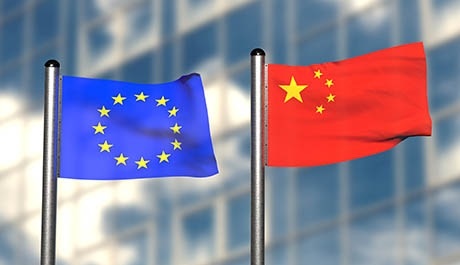Three Reasons Why the EU Neds to Reshape its Strategic Partnership with China
Monday’s online summit between the EU and China clearly exposed the need to reshape mutual relations. At the same time, it failed to provide any indication that progress in that direction is likely, with both sides assuming diverging positions on most issues and a lack of joint communiqué.
With the increasing trade deficit for the EU, unequal market access and the balance of direct investments significantly tilted in Chinese favor, European policy makers and business organizations have become louder in their requests for reciprocity and level playing field. The right policy measures should be employed to ensure that the future of the EU-China strategic partnership is based on equality, trust and mutual benefit, rather than competition and rivalry. If they are to achieve any meaningful and sustainable impact, and avoid potential backfiring, the measures should be integrated into the strategic partnership framework.
Intertwined economies
Contrary to the EU’s expectations, China’s accession to the World Trade Organization marked a halt to its liberalization efforts. Every subsequent concession that China made towards greater opening-up has been driven more by its domestic needs than by foreign pressure. For many years China skillfully used the pretext of its developing country status to avoid any reform that could potentially harm its domestic companies and to promote measures to bolster key industries, develop new technologies and build national “champions”. By the time the EU realized how asymmetric the relationship had become, the two economies were so deeply interconnected that it has became impossible to undertake unilateral measures without severing its own economy.
Uneven corporate playing field
European companies in China complain about the lack of transparency of the Chinese system which favors domestic companies, restricts access for foreign entities to public procurement and investment possibilities and imposes a number of bureaucratic and non-tariff barriers. This is not only limited to doing business in China, but also to all opportunities managed by Chinese institutions abroad, including large scale infrastructure projects within the BRI. The tendering procedures are conceived in a way that limits competition mostly to Chinese state-owned enterprises (SOEs), providing them with access to new markets and opportunities to gain valuable experience and become more competitive globally. At the same time, operating under market conditions and with strict limitations concerning state aid, European companies neither have the same starting position nor the same privileged access to information and lobbying channels, amply used by their Chinese competitors.
Complex geopolitical landscape
The increasing tensions between China and the USA put additional pressure on the EU to pick a side. But, the oversimplified dilemma between core values and economic interests neglects the broader impact that such a choice could have. Any straightforward decision is likely to have serious economic consequences for European companies operating on the Chinese or American market. For the time being, the EU still prefers the multilateral approach and tacitly agrees to overlook Chinese domestic issues impinging on the values that the EU strives to promote worldwide. But, according to the outcome of the last summit, even that “leniency” does not seem to be a sufficient incentive for China to accept EU’s requests for further market access. While the ongoing negotiations for a Comprehensive Investment Agreement are still far from conclusion, the EU should create and implement a set of new measures within its own market, based on reciprocity and targetted to protect and promote its corporate interests in China.

